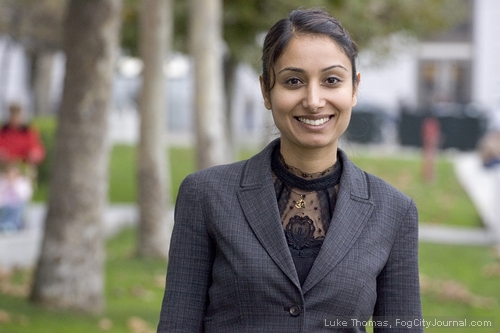
Veena Dubal
Photo by Luke Thomas
Commentary by Veena Dubal
January 21, 2009
On a bus somewhere between Marrakech and Rabat, we were asked how we felt about Obama.
“In Morocco, we are optimistic about the new American President . . .” said Zayed, our guide, unsure about our reactions and how it would impact his tip. Not wanting our multifarious politics to disrupt our family vacation, I quickly replied from the back of the bus before the arguing could begin, “We are of different views.”
My boyfriend is a Republican. My radical brother voted on the Green ticket. My dad and brother-in-law, moved by the possibility of having a black man as President, voted for the first time in their lives. When I cast my ballot in November, I felt both the pull of my familial ties and my political convictions.
Let me be clear: I was not voting for McCain (sorry, Ry). But I had trouble fathoming the Obama-mania that consumed this country. Sure, it was exciting to have a black man run for President. But the identity politics surrounding support for Obama irked me – particularly when it came from the South Asian, Arab, and Muslim communities. What did it matter if we had a black President if it would be more of the same disastrous U.S. foreign policy in the Middle East? More slaughtering, more strangling, more empire-building?
Just a year ago, Obama spoke of strengthening the military and protecting “national interests,” using the phrase in order to move ambiguously between the interest of stopping terrorism against American citizens and the interests of big capital. Although he has called for withdrawal in Iraq, he has also expressed desire for a continued military presence in the region and refuses to rule out military action against Iran. Obama was the first and only presidential candidate to suggest an all out war in Pakistan. He, like candidates before him, bowed to the power of the Israeli Lobby (AIPAC) instead of taking a firm stance against colonialism and genocide in Palestine.
As a South Asian American – a postcolonial subject now part of the colonizing world – I wanted to vote for change – not for symbolism.  I was crestfallen every time I heard a fellow community organizer and activist jokingly lament that little work would be left for us if Obama won the Presidency. I couldn’t believe my ears – if Obama was elected did that mean that racism, classism, and xenophobia were things of the past? Did that mean that I wouldn’t be called a “home grown terrorist” in the streets, that the police would never again kill an Oscar Grant, and that family would be legally defined by choice instead of by heterosexuality?
Weeks after I cast my ballot and just days after I silenced the broiling family debate in North Africa (a debate that aptly arose in a place that would be more affected by the new American President than I would be), I listened to Obama give his inaugural speech among fellow San Franciscans in front of City Hall. I – like many in the crowd – was blown away. He spoke to the need for multi-lateralism and increased social services; he pledged to work alongside the developing world and to stop this country from using the world’s resources. He promised to work with “old foes” and rejected “as false the choice between our safety and our ideals.”  The roar of the crowd and my own rising hopes confirmed my suspicions: never has an elected official been so loved by people who are so innately critical.
Today, the morning after the inauguration, I sit at work and nurse the hangover of withered optimism.  The speech was beautiful, but words are easy. If we the people don’t maintain a critical eye – a skill that became second nature during the Bush regime – the light of hope that Obama’s inaugural words put in each of us will flicker and die. We must remember the “we” in “Yes, we can.” As Americans, as Natives, as Immigrants, as Workers, we must step out from beneath the shadow of this man and once again embody our own convictions. We must remember how to be critics, how to protest, how to boycott, how to hold this President and this Empire accountable to the people of this country and the world.
Veena B. Dubal is an attorney and Berkeley Law Foundation Fellow at the Asian Law Caucus. Veena’s taxi project helps to address and remediate the labor conditions in San Francisco’s largely immigrant taxi driver community. She also focuses on issues of civil rights and national security.
Prior to her fellowship at the Caucus, Veena was on a Fulbright Scholarship in India where she completed Ph.D. research on access to justice and the legal aftermath of the anti-minority violence that swept the state of Gujarat in 2002.  While in law school at the University of California at Berkeley, Veena served as a community activist working on issues of racism, imperialism and war through her capacity as volunteer coordinator at the Alliance of South Asians Taking Action. During the tenure of her joint J.D./Ph.D. program at Berkeley, she was awarded the Jurisprudence Award in Law and Middle Eastern Societies, the Critical Language Study Award for Hindi study, the Foreign Language and Area Studies Fellowship, the South Asian Law Student Association Scholarship for Community Organizing, the Adams Scholarship, and was Associate Editor of the Asian Law Journal. Her community publications include, “The FBI Witch-hunt in Lodi,” (co-written) and “Hum Kar Sakte Hain?” Veena received her B.A. with honors from Stanford University in International Relations with a minor in Feminist Studies.


 The Hunger Site
The Hunger Site
January 21, 2009 at 3:23 pm
I found it interesting that your father and brother voted for the first times in their lives based solely on the colour of a person’s skin.
Who says that racism isn’t alive and kicking?
I also wonder how many other people thought the same way.
Let’s face it: Obama may be black, but he’s wearing a white man’s suit.